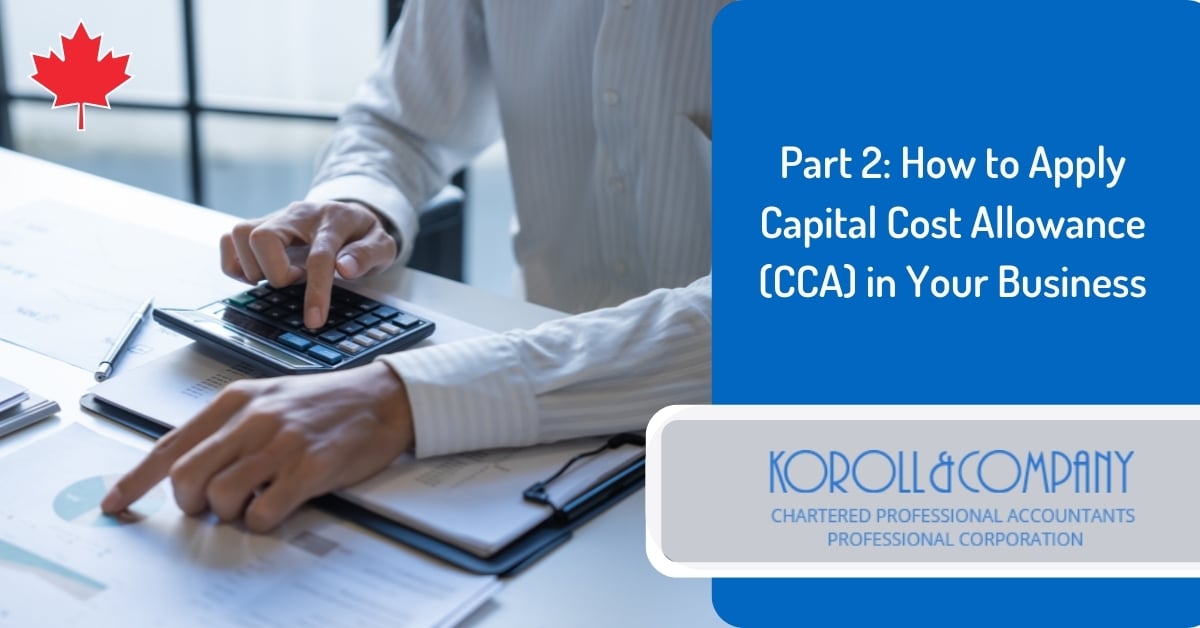
In Part 1, we covered the basics of capital assets, depreciation, and CCA. Now let’s take a closer look at how CCA works in practice, and the rules that can help small business owners in Ontario.
CCA Classes and Rates
The CRA groups assets into categories called CCA classes, each with its own rate. Examples include:
- Class 1 (4%): Most buildings purchased after 1987
- Class 10 (30%): Most vehicles and automotive equipment
- Class 12 (100%): Small tools, kitchen utensils, and software (under $500 each)
- Class 50 (55%): Computers and systems software
Knowing which class your asset belongs to is critical for applying the correct deduction.
The Half-Year Rule
In the year you purchase an asset, you can usually only claim half of the normal CCA amount. This prevents businesses from buying assets late in the year just to maximize tax deductions.
For example, if you buy a vehicle for $20,000 in a 30% class:
- Normal claim: $6,000 (30% of $20,000)
- Half-year rule claim: $3,000
Accelerated CCA
To encourage business investment, the Canadian government introduced Accelerated CCA, which allows larger deductions in the first year (sometimes up to three times the normal rate).
Benefits include:
- Bigger first-year deductions.
- Improved cash flow by reducing taxable income early.
- Greater incentive to invest in assets like manufacturing equipment or clean energy technology.
Note: Accelerated CCA is a temporary measure being phased out by 2028, so planning matters.
Depreciation vs. CCA
It’s important to note the difference:
- Depreciation: An accounting method that spreads an asset’s cost over its useful life, used for financial reporting.
- CCA: A tax deduction set by the CRA, used specifically for Canadian tax purposes.
Recapture and Terminal Loss
When you dispose of a depreciable asset, you may face additional tax consequences:
- Recapture: If you sell the asset for more than its remaining UCC, you must add the difference back into your taxable income.
- Terminal Loss: If you sell the asset for less than its remaining UCC, you can deduct the difference as a loss.
Special Considerations
- Land is not depreciable.
- Living things (like animals or trees) are generally not depreciable, though timber rights and similar assets may qualify.
- Partnerships claim CCA at the partnership level, not individually.
- If your fiscal period is less than 365 days, your CCA must be prorated.
For Canadian small business owners, understanding capital assets and CCA is essential for accurate bookkeeping and smart tax planning.
- Track asset purchases carefully.
- Apply the right CCA class and rate.
- Use accelerated CCA strategically while it’s available.
- Be mindful of recapture or terminal loss when disposing of assets.
With proper planning, CCA not only helps reduce your taxable income but also improves cash flow, making it easier to reinvest in your business.
Koroll & Company is an accounting firm located in Newmarket, Ontario. We provide a full range of services including accounting, auditing, taxation and business advisory services. Our clients represent a broad cross section of small to large owner managed business and not-for-profit organizations. Contact us today!






